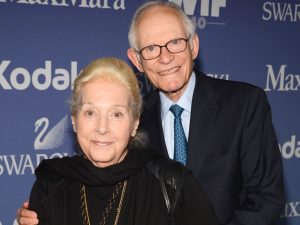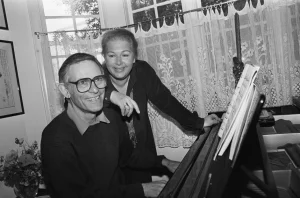Alan Bergman, the iconic American songwriter best known for co-writing the deeply nostalgic ballad “The Way We Were,” passed away on Thursday night at his Los Angeles home. He was 99.
Bergman, who was celebrated for his ability to capture emotion through music, had been experiencing respiratory issues in recent months. Still, he continued to write music until his final days, according to a statement released Friday by family spokesperson Ken Sunshine. His death marks the end of an extraordinary era in American songwriting, where he stood as a towering figure of lyrical brilliance.
From Brooklyn to Hollywood: How Alan Bergman’s Early Life Shaped His Musical Journey
Born on September 11, 1925, in Brooklyn, New York, Alan Bergman showed an early inclination toward music. After serving in the Army during World War II, he pursued higher education in music at the University of North Carolina and later at UCLA. These formative years helped him build a foundation in classical composition and jazz, both of which would influence his writing style in decades to come.
Bergman began his professional career in television in Philadelphia before moving to Los Angeles to immerse himself in the entertainment industry. There, his fate took a defining turn when he met fellow lyricist Marilyn Keith. The duo would later become one of the most celebrated songwriting teams in music history.
Also Read : Mohit Suri’s Saiyaara: From Initial Rejection to Box Office Gold

A Timeless Songwriting Partnership with Marilyn Bergman That Defined Generations
Alan Bergman married Marilyn Keith in 1958, cementing not just a lifelong personal bond but also a professional alliance that would transform the world of music. As the Alan Bergman lyricist partnership took shape, they began writing songs that combined poetic nuance with emotional sincerity.
Together, they worked with elite composers such as Michel Legrand, Marvin Hamlisch, Quincy Jones, Cy Coleman, and John Williams. Their lyrics often served as emotional anchors for iconic films and became the backdrop for the voices of Frank Sinatra, Barbra Streisand, Tony Bennett, and Michael Jackson.
Their collaboration continued uninterrupted until Marilyn’s death in 2022. Over their six-decade-long career, they wrote hundreds of songs, spanning film, television, Broadway, and symphonic works.
A Catalogue of Award-Winning Songs That Transcended Time and Genres
The music written by the Alan Bergman lyricist duo became synonymous with the emotional arcs of many films and characters. Among their most celebrated works:
- “The Way We Were” (1973) – With composer Marvin Hamlisch, sung by Barbra Streisand for the film of the same name. This deeply nostalgic piece became the top-selling song of 1974 and earned the Bergmans an Academy Award.
- “The Windmills of Your Mind” (1968) – Co-written with Michel Legrand for The Thomas Crown Affair, this intricate and poetic lyric earned them their first Oscar.
- “It Might Be You” (1982) – Collaborating with Stephen Bishop and Dave Grusin, this tender theme from Tootsie remains one of their most loved compositions.
- “How Do You Keep the Music Playing?” (1982) – A soul-stirring ballad written with Legrand for the film Best Friends.
- “Nice ’n’ Easy” (1960) – A smooth, jazzy number sung by Frank Sinatra that quickly became one of his signature songs.
They also penned beloved TV theme songs for shows such as Maude, Good Times, and Alice, expanding their reach beyond film and into households nationwide.

The Bergmans at the Oscars: A Consistent Fixture on Hollywood’s Biggest Night
The Academy Awards frequently became a showcase of the Bergmans’ lyrical prowess. Between 1969 and 1995, they earned 16 Oscar nominations and took home three statuettes. In one notable year, 1983, three of the five Best Original Song nominees had lyrics by the Bergmans.
Their contributions weren’t limited to cinema. They won two Grammys, four Emmys, and received a Lifetime Achievement Award from the Songwriters Hall of Fame. In 1997, they were honored with the Johnny Mercer Award, one of the highest accolades a songwriter can receive.
Influencing Generations with Emotionally Resonant Lyrics That Captured the Human Condition
What set Alan Bergman apart was his ability to write lyrics that were both profound and accessible. His songs conveyed complex emotions with simplicity and elegance. As a lyricist, Alan Bergman focused on truth, clarity, and storytelling—qualities that made his work timeless.
The emotional gravity in songs like “The Way We Were” or “What Are You Doing the Rest of Your Life?” was not only shaped by their melodic composition but also by the lyrical finesse that defined his career.
His lyrics often addressed themes of memory, love, and time—universal subjects that resonated deeply with listeners across generations.

Legacy That Lives On Through Barbra Streisand and Other Musical Giants
Among their most frequent collaborators, Barbra Streisand stood out as both a performer and personal friend. Her 2011 album, What Matters Most, consisted entirely of songs written by the Bergmans and served as a tribute to their legacy. In interviews, Streisand described their songs as “truthful, emotionally profound, and musically inseparable from the voice of a generation.”
Their work also extended to Broadway, where they wrote lyrics for the musical Ballroom, and to symphonic music, including their contribution to Visions of America, a photo-symphony that paired visuals with orchestral music.
Final Years Marked by Endurance, Creativity, and a Lasting Artistic Flame
Despite his age and the loss of Marilyn, Alan never stopped creating. In his 90s, he continued writing and even recorded Lyrically, Alan Bergman, a solo album where he performed his own songs. This dedication to craft reflects a lifelong devotion to music that never faded.
Alan Bergman leaves behind his daughter Julie Bergman Sender, a respected film producer, and a granddaughter. But more significantly, he leaves behind a legacy inscribed into the fabric of American music.
The End of a Chapter, But Not the End of the Song
Alan Bergman’s passing marks the loss of one of the most influential figures in American songwriting. His ability to transform feeling into verse and match it seamlessly with melody earned him accolades, but more importantly, it earned him a permanent place in the hearts of millions.
As the world mourns this monumental loss, the words of Alan Bergman will continue to play on—echoing in movie theaters, living rooms, concert halls, and memory itself.

